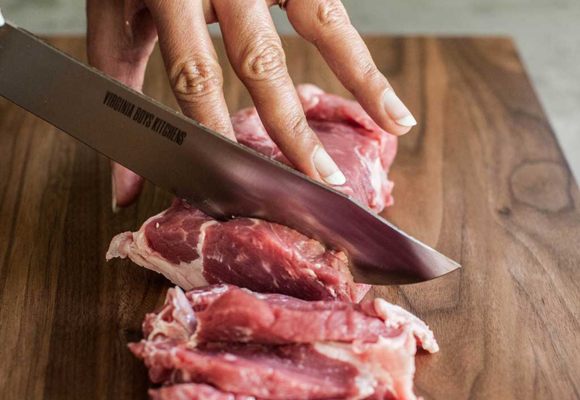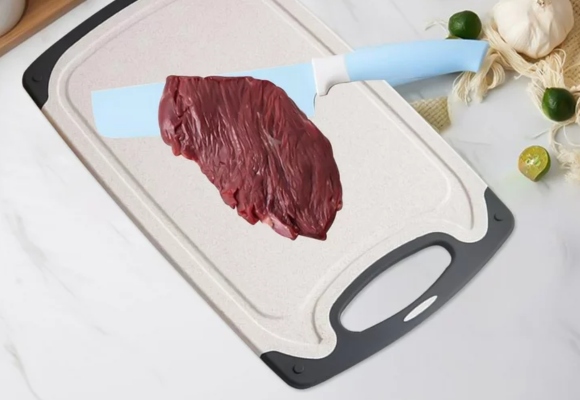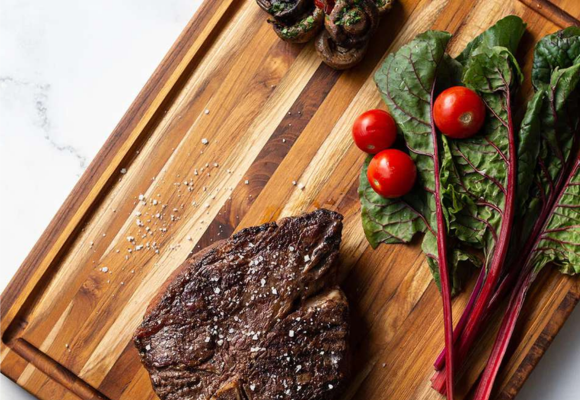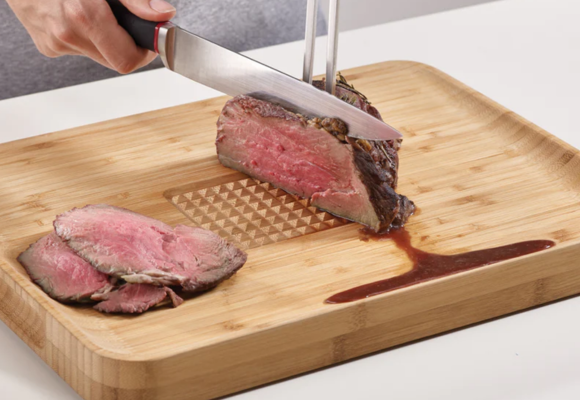Bamboo cutting boards have gained significant attention in the culinary world, heralded for their durability, eco-friendliness, and aesthetic appeal. But when it comes to preparing meat, many wonder if bamboo is the right choice. Let’s explore the world of bamboo cutting boards and assess their suitability for handling meat, comparing them with other popular materials like plastic and traditional wood.

Is Bamboo Good for Cutting Boards?
Eco-Friendly and Sustainable: Bamboo is a highly renewable resource, growing much faster than traditional hardwoods. This rapid growth makes it a sustainable choice for environmentally conscious consumers. Bamboo’s natural resilience also translates into long-lasting cutting boards.
Durability and Maintenance: Bamboo cutting boards are hard enough to withstand the rigors of daily use without dulling your knives. They are less porous than traditional woods, making them less prone to cracking and warping. Maintenance is straightforward – a simple wash with soap and water keeps them clean, though they should not be soaked in water or put in the dishwasher.
What is the Healthiest Cutting Board to Use?
Hygienic Considerations: When it comes to health, the primary concern with cutting boards is the risk of cross-contamination, especially with raw meat. Bamboo’s dense structure offers a less hospitable environment for bacteria compared to softer woods and certain plastics. Its natural antibacterial properties add an extra layer of hygiene.
Chemical-Free: Unlike some plastic boards, bamboo cutting boards are often free from harmful chemicals like BPA. This is a significant advantage for health-conscious consumers who want to reduce their exposure to synthetic substances.
Is it Safe to Cut Meat on a Bamboo Cutting Board?
Preventing Cross-Contamination: While bamboo is naturally more resistant to bacteria than other materials, it’s crucial to practice proper kitchen hygiene. This means using separate cutting boards for meat and other foods, or thoroughly cleaning the board between uses.
Surface Integrity: The hardness of bamboo ensures that it doesn’t get easily scarred. Deep cuts on cutting boards can harbor bacteria, so bamboo’s resistance to knife marks is a plus for meat preparation.
Plastic vs. Bamboo

Ease of Cleaning: Plastic boards can generally go into the dishwasher, making them easy to sanitize. Bamboo, however, requires hand washing. This could be seen as a minor inconvenience compared to the environmental and health benefits of bamboo.
Longevity and Impact on Knives: High-quality bamboo boards can last for years without dulling your knives, unlike some harder plastic boards which can be tougher on knife edges.
Aesthetic and Environmental Impact: Bamboo boards offer a warm, natural aesthetic that plastic boards can’t match. Additionally, the eco-friendly aspect of bamboo is a clear advantage over plastic, which contributes to environmental pollution.
Bamboo Cutting Board vs. Wood

Hardness and Durability: While traditional woods like maple are known for their durability, bamboo matches or exceeds their hardness, offering similar longevity.
Moisture Resistance: Bamboo’s natural oils make it more resistant to moisture than many woods, reducing the likelihood of warping and cracking.
Sustainability: Bamboo outshines traditional woods in sustainability. Its rapid growth and renewable nature make it a more eco-friendly option.
Aesthetics: Bamboo has a unique, elegant grain that can complement a variety of kitchen styles, from modern to rustic. Its beauty is on par with that of fine hardwoods.
Hygiene: Bacteria Resistance and Food Safety
- Bamboo: Bamboo’s dense structure makes it less hospitable to bacteria, reducing the risk of cross-contamination. It also possesses natural antibacterial properties, offering an added layer of protection when preparing food, especially meat.
- Plastic: While non-porous and easy to clean, plastic can harbor bacteria in scratches over time. High-quality plastic boards can resist deep scratches, but lower-grade plastics can become a breeding ground for bacteria if not replaced regularly.
Environmental Impact: Sustainability and Eco-Friendliness
- Bamboo: As a highly sustainable resource, bamboo grows rapidly and requires fewer resources to cultivate compared to hardwoods. It’s biodegradable and doesn’t contribute to deforestation, making it an eco-friendly choice.
- Plastic: Plastic cutting boards are not biodegradable and can contribute to environmental pollution. Their production and disposal have a larger carbon footprint compared to bamboo. However, recycled plastic boards are available, offering a more eco-conscious option within the plastic category.
Durability and Longevity
- Bamboo: Known for its strength and durability, bamboo cutting boards can withstand years of use without significant wear and tear. They are less prone to warping and cracking compared to some types of wood.
- Plastic: The durability of plastic boards varies widely based on quality. Higher-end models can be quite durable, but many are prone to warping and may need frequent replacement, especially when heavily used or exposed to high temperatures.
Maintenance and Care
- Bamboo: Requires hand washing and should not be soaked in water or cleaned in a dishwasher. Bamboo boards benefit from occasional oiling to maintain their condition.
- Plastic: Most plastic boards are dishwasher safe, making them easy to clean and sanitize. However, they may become brittle and warp over time with repeated dishwasher use.
Impact on Knives
- Bamboo: Harder than some woods but still gentle on knives, bamboo boards won’t dull blades as quickly as some materials. However, they are harder than plastic, which means they might slightly dull knives faster than softer plastic boards.
- Plastic: Generally softer than bamboo, plastic can be gentler on knives. However, very hard plastic boards can be tough on knife edges, leading to quicker dulling.
Aesthetics and Kitchen Compatibility

- Bamboo: Offers a warm, natural look with a unique grain pattern. Bamboo cutting boards can be a stylish addition to any kitchen, fitting well with various decor styles.
- Plastic: Comes in a variety of colors, which can be helpful for color-coding to prevent cross-contamination. However, they lack the natural aesthetic of bamboo and might not blend as seamlessly into all kitchen styles.
In summary, the choice between plastic and bamboo cutting boards hinges on priorities such as environmental impact, hygiene, maintenance ease, and aesthetic preferences. Bamboo stands out for its sustainability, natural antibacterial properties, and elegant appearance. In contrast, plastic offers practicality, especially in terms of ease of cleaning, but lacks the eco-friendliness and aesthetic appeal of bamboo. Both materials have their unique advantages, making the choice a matter of personal preference and kitchen needs.
pros and cons of bamboo cutting boards
The pros and cons of bamboo cutting boards, especially in the context of their use for meat preparation.
Pros of Bamboo Cutting Boards
after the looking of totally reviews of Bamboo cutting boards bamboo cutting boards have not only healthy benefitsf as well also have some other which are following…
- Eco-Friendly: Bamboo is a highly sustainable resource. It grows quickly, requires minimal pesticides, and is biodegradable, making it an excellent choice for environmentally conscious consumers.
- Naturally Antibacterial: Bamboo has natural antibacterial properties. This makes it a safer option for cutting meat, as there’s less risk of bacterial growth compared to some other materials.
- Durable and Strong: Despite being lightweight, bamboo cutting boards are incredibly strong and durable. They are resistant to scarring and scratches, which helps prevent bacteria from settling in.
- Gentle on Knives: Bamboo is hard enough to offer excellent durability yet gentle enough not to dull your knives quickly, preserving the longevity of your cutlery.
- Aesthetic Appeal: With its natural grain and warm color, bamboo adds an elegant and organic touch to any kitchen.
- Low Maintenance: They are relatively easy to clean and maintain. Regular washing with soap and water and occasional oiling can keep them in great condition.
Cons of Bamboo Cutting Boards
- Can Be Prone to Splitting: If not properly maintained (like being left in water or exposed to high heat), bamboo boards can split or crack over time.
- Not Dishwasher Safe: Unlike some plastic counterparts, bamboo cutting boards cannot be cleaned in a dishwasher, requiring hand washing instead.
- May Require More Frequent Oiling: To maintain their best condition and prevent drying out, bamboo boards may need to be oiled more frequently than some other types of wood boards.
- Not Entirely Knife-Scuff Resistant: Although bamboo is durable, it can still show knife marks over time, especially with heavy or improper use.
- Limited in Style and Color Options: Unlike plastic boards, which come in a variety of colors for kitchen coordination and cross-contamination prevention, bamboo has a more uniform look.
- Potential for Chemicals: Some bamboo boards may be constructed using adhesives or finishes that contain harmful chemicals, though this is largely dependent on the manufacturer.
conclusion
bamboo cutting boards are a fantastic choice for preparing meat. They balance durability, hygiene, and environmental sustainability, all while being kind to your knives and adding a touch of elegance to your kitchen. While they require some specific care, such as hand washing, the benefits they offer make them a worthy addition to any kitchen. Remember, no matter the material of your cutting board, proper cleaning and maintenance are key to ensuring food safety and extending the life of your board. With a bamboo cutting board, you can enjoy the peace of mind that comes with using a product that is not only good for your kitchen but also good for the planet.
Frequently Asked Questions
Do chefs use bamboo cutting boards?
Yes, many chefs use bamboo cutting boards as part of their kitchen arsenal. Bamboo cutting boards are favored by some chefs for their combination of durability, sustainability, and hygiene. They are known for being tough yet gentle on knives, and their natural antibacterial properties make them a safe option for food preparation. Additionally, the eco-friendly aspect of bamboo appeals to chefs who are conscious about sustainability and environmental impact.
However, it’s important to note that chefs often use a variety of cutting board materials depending on the specific task. For instance, some might prefer plastic boards for certain types of food preparation due to their ease of cleaning and maintenance. But for chefs valuing a balance of functionality, environmental friendliness, and aesthetic appeal, bamboo cutting boards are a popular choice.

